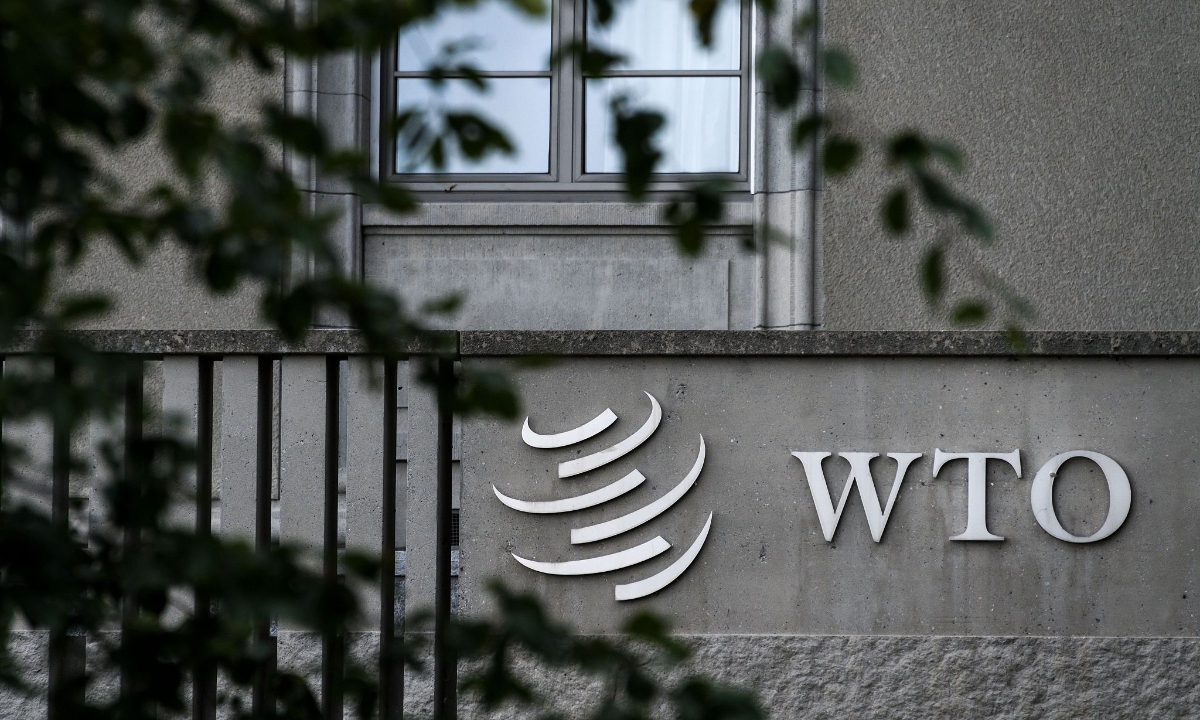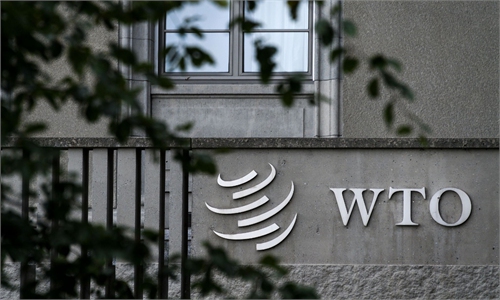Expect some surprises for the world at the WTO’s 2024 Ministerial Conference: Global Times editorial

A sign of the WTO on its headquarters in Geneva Photo: VCG
From Monday to Thursday, trade ministers and senior officials from 164 World Trade Organization (WTO) members will gather in Abu Dhabi, the United Arab Emirates, for the organization's 13th Ministerial Conference (MC13).The biennial Ministerial Conference is WTO's highest decision-making body, and its discussions and outcomes have a significant impact on the organization itself as well as global trade. This year's meeting will focus on important issues, including WTO reform, dispute settlement mechanisms, e-commerce, as well as trade and environmental sustainability. It has also attracted global attention since it is considered to be a valuable opportunity to further promote the development of the organization and address global challenges.
However, judging from the current media reports on the draft texts of the meeting and the list of possible outcomes, or the remarks of all parties, the expectations for the MC13 are not optimistic. WTO Director-General Ngozi Okonjo-Iweala has repeatedly said this year's meeting will be very "difficult" due to factors such as regional conflicts, various elections around the world, uneven economic growth and trade protectionism. As for the US that has been equivocal about the most-watched issue of WTO reform, its Trade Representative Katherine Tai also said she did not anticipate a massive reform agreement from this year's event.
It should be noted that the WTO is at a relatively critical crossroads. On the one hand, the organization has still not fully recovered from the severe damages caused by the US, so it is difficult to say that its existential crisis has been lifted. The US continues blocking the restoration of the normal functioning of the WTO Appellate Body, while voices supporting anti-globalization and trade protectionism are still strong in the country. All of these cast a shadow on the future development of the WTO. On the other hand, even though some people are pessimistically predicting that the WTO is "teetering on the abyss of irrelevance," facts have proved that the importance of this organization as the only global international organization dealing with the rules of trade among countries has become even more prominent. The WTO is still the best guardrail preventing the world from plunging into trade dislocations and economic fragmentation, and the vast majority of its members are looking forward to the proceeding of the WTO reform to meet the current challenges of global trade.
In many specific areas, there are disagreements, but possible progress can also be expected. For example, while the resumption of normal functioning of the Appellate Body is unlikely at this point, negotiations on how the dispute settlement mechanism will resume functioning and a possible road map could be seen as progress. The Investment Facilitation for Development (IFD), mainly promoted by China, has gained the support of three-quarters of the WTO members. Although there are still different voices on the move from a plurilateral agreement to a WTO-level agreement, a joint ministerial statement will be issued and made public during this meeting and this will undoubtedly be a huge step forward in improving the global investment climate.
To some extent, this also means that there is a lot of room for on-site efforts in the coming days. Previous experience has shown that sometimes decisions may be made late at night or at the last minute, during which all parties try to find a balance or compromise. The WTO Director-General mentioned that the mood among diplomats finessing the draft texts for the Abu Dhabi meeting was more positive and constructive than it was the last time. In fact, for the WTO, which is currently in a state of gradual reforms, it does not matter to have conflicts and differences. What is important is to gather the greatest possible consensus on maintaining the global trading system with the WTO as the core, and to continue to move in the general direction of promoting WTO reforms. Measures without substantial meaning should be avoided and should not become mere talk.
As early as in 2019, China officially submitted the document of China's Proposal on WTO Reform to the WTO, proposing four areas for concrete actions for reforms: first, resolving the crucial and urgent issues threatening the existence of the WTO; second, increasing WTO's relevance in global economic governance; third, improving the operational efficiency of the WTO; and fourth, enhancing the inclusiveness of the multilateral trading system. Although unilateralism, trade protectionism and trade bullying have become rampant in recent years, multilateralism is more popular because it is in line with the common interests of the world; although the WTO has been confronted with severe challenges, it still represents the broadest and strongest consensus in the international community.
At a time when the global economic recovery is sluggish, trade, characterized by creating net economic gains for the world and having an inextricable link to global prosperity and stability, should be given higher priority. As long as the two major engines of trade and investment covered by the WTO are repaired, there is great hope for the world economy to return to normal growth, and all members must make practical efforts to this end. China will, as always, practice true multilateralism, firmly safeguard the multilateral trading system, fully and deeply participate in the reforms of the WTO and support the WTO to play a better role. It is willing to strengthen cooperation with all parties and actively promote the conference to achieve more practical results.


